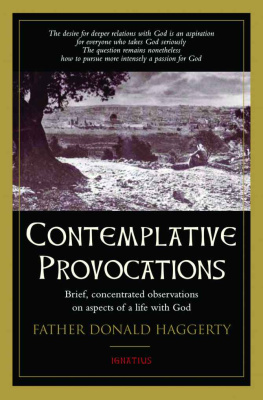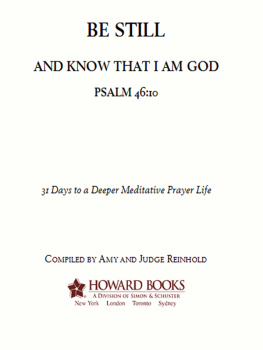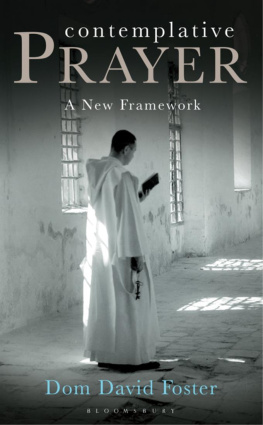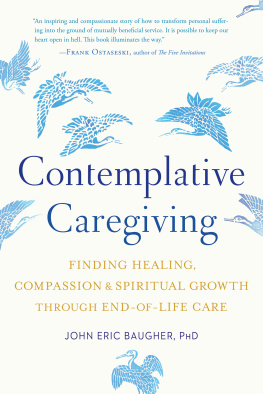Contemplative Provocations
FR. DONALD HAGGERTY
Contemplative
Provocations
IGNATIUS PRESS SAN FRANCISCO
Cover photograph by Elia Kahvedjian
Jerusalem
Cover design by Roxanne Mei Lum
2013 by Ignatius Press, San Francisco
All rights reserved
ISBN 978-1-58617-733-1
Library of Congress Control Number 2012942821
Printed in the United States of America
To my mother and father.
Contents
Foreword
The very title of this work by Fr. Donald Haggerty, Contemplative Provocations , describes something of the authors methodology and the achievable purpose he envisions for anyone who would read this rich manuscript. This is truly a thought-provoking effort, offering what appears to be a kind of manual of personal cooperation with the grace of God and some spiritual direction. In much the same way as Saint Ignatius great classic, the Spiritual Exercises , might be thought of as a type of manual on how to direct a week or month of retreat on the spiritual pilgrimage of life, Fr. Haggertys work might indeed be read as a road map for the ambitious migration of the spiritual life through the darkness and emptiness of the mission of charity as lived by Blessed Mother Teresa of Calcutta, and carried on by her Missionaries of Charity. Fidelity to this pilgrimage leads toward the light and fulfillment of the desert spiritually transformed.
This is not a do-it-yourself kit but rather, it is an honest effort to extend spiritual advancement in the courageous pilgrimage of faith to all walks of life and to explain the terms of that advancement more practically, profoundly, and invitingly. This is not some peace-filled, undisturbed vision, some comfortable distance away from the challenging field of the spiritual combat for real growth; this is no idyllic view from a restful hillside or shore. This offers a battle plan, a tactical set of suggestions for the road less traveled.
Contemplative Provocations teaches us that faith grows in the Church by contemplation, study, lived experience and obedience to the Magisterium, a formula suggested by the Second Vatican Council for the whole Church. It provides an experiential guide, a truly inductive approach to time-proven methods, based strongly on Eucharistic reflections nourished by the Word of God ( the very words of Christ ) in the practice and interpretation of the Church. This is a shared experience of one who is truly trying to work out his own spirituality as a priest, and many of his insights are most inspiring. This work presents the vocation of the baptized as a search for absolute, authentic holiness, an effort to live by the gift of wisdom, judging reality by its ultimate causes, that one reality which is necessary. The text is based solidly on the tradition of the Church, as is clear from even a cursory glance at the chapter headings:
Faiths Passion. Faiths Blindness. The Mind in Prayer. Poverty of Soul.
I find that three features stand out in Fr. Haggertys work:
1. The author offers a genuine insight into kenosis : a putting on the mind of Christ Jesus (cf. Phil 2:5ff.): there is presented here a real possibility of living a life in Christ, a life in the Holy Spirit (see CCC 1691ff.).
2. These pages do not presume to indoctrinate or give precise solutions for overcoming the usual struggles in prayer. Rather, they offer a hope that the faithful believer who strives to live more and more in correspondence with Gods grace will develop an interior longing. We need a deeper receptivity. A lifelong living of the fiat of Christian Baptism makes us more aware of the disproportion within ourselves.
3. This is more like a modern approach to the ministry of encouragement, a kind of modern paranesis , or paraclesis , inspired by the Paraclete, in which all the baptized are moved to help one another along the way of the Cross: Joseph who was surnamed by the apostles Barnabas (which means, Son of encouragement) (Acts 4:36).
The author makes a strong appeal also for personal study:
Catholic doctrinal truth and sound spirituality are companions. They support and protect each other; they shed luminosity on the importance of the other. But they also starve together when either is neglected, when one does not nourish the other.
This paragraph is so reminiscent of the beautiful ideal expressed in the Catechism of the Catholic Church :
In the work of teaching and applying Christian morality, the Church needs the dedication of pastors, the knowledge of theologians, and the contribution of all Christians and men of good will. Faith and the practice of the Gospel provide each person with an experience of life in Christ, who enlightens him and makes him able to evaluate the divine and human realities according to the Spirit of God. Thus the Holy Spirit can use the humblest to enlighten the learned and those in the highest positions. (CCC 2038)
Fr. Haggertys experience with Mother Teresas darkness as well as the dark night of Saint John of the Cross have enabled the author to see farther in the darkness:
A larger number of these thoughts have some link to my contact with Mother Teresas Missionaries of Charity. Many observations on these pages had a beginning in conversations with sisters during retreats I have given to their congregation over a number of years which were then pondered privately in prayer.
This is intimately connected with Fr. Haggertys chapter 10, Suffering and Trial. One of the great points of discussion among Christologists a few years back was the question of suffering in God. Scripture seems to make it quite clear that there are various motives offered by Scripture for human pain: eschatology; pedagogy; punishment; purification; redemption, and the Cross of Jesus Christ. There is no visceral pessimism here or buried grief. Fr. Haggerty is teaching a hard lesson. We might note Saint Ignatius ideal that only God knows what he would accomplish in souls were he not hindered in the process. A like-sounding high principle of the modern Evangelical theologian J. Moltmann states that original sin is not so much the titanic desire to be like God as, rather, the refusal to be what God likes! Our fiat to God does not give God permission to torment us; there is asked of all the baptized a profound surrender and not just resignation.
In summary: By his wounds, ours are healed (cf. Is 53:5; 1 Pet 2:24): as with the prophet Hosea, we may be struck down, but the Lord will bandage our wounds! (6:2); the thoughts of the author indicate that the stigmata of life provide God with openings for his blessings:
A deeper love for God is inseparable from being wounded over time. Only by a divine wound does our love for God intensify. This is in part a wound of inner discontent within our soul.[Quoting Augustin Guillerand] Someone wounds our soul with a wound which will never heal, and it is through that wound that He finds His way to the very center of our being.Jesus words in Matthew 25 move us only when understood quite literally in their meaning. Then it is realized that his promise has been kept. He invites us to touch his presence personally in the poor, to clasp the wounds of his crucifixion in the bodies of the poor.
Fr. Haggertys text is a rewarding work for anyone striving to deepen his spiritual life.
Timothy Cardinal Dolan
Archbishop of New York
September 17, 2012
Introduction
Love does not always heed the desires of those whom it loves.
Augustn Guillerand
The desire for deeper relations with God is an aspiration for everyone who takes God seriously. The question remains nonetheless how to pursue more intensely a passion for God. Certainly some practice of interior prayer is necessary for a souls intimacy with God. In the Catholic tradition there are many fine books teaching methods of silent prayer in order to get started. There are fewer works addressing the deeper issues that arise as one perseveres in prayer and the pursuit of God. The best sources for such questions are found in the classical spiritual treatises, for instance in the writings of the great Carmelite saints Saint John of the Cross and Saint Teresa of Avila, or in Saint Francis de Sales, or in a work like the anonymous Cloud of Unknowing . Contemporary works that explain the teachings of the spiritual masters can be also very useful, such as those of the late Fr. Thomas Dubay.
Next page









